
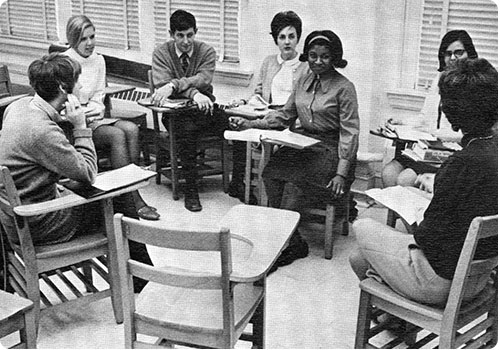
1970 Graduate School Adds Two New Degrees - Two major changes were made in the Graduate School this year. A Master of Business Administration, qualifying recipients of this degree to teach in community colleges and at technical education centers, was added. A new program in Communications was implemented, primarily for speech therapists. In addition, Winthrop offers the Master of Arts, Master of Arts in Teaching, Master of Education, Master of Music, and Master of Science degrees. Mrs. Heath uses group discussion for better comprehension in Sociology course.
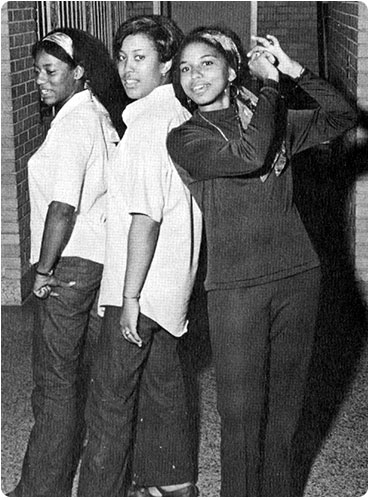
1970 African American Students
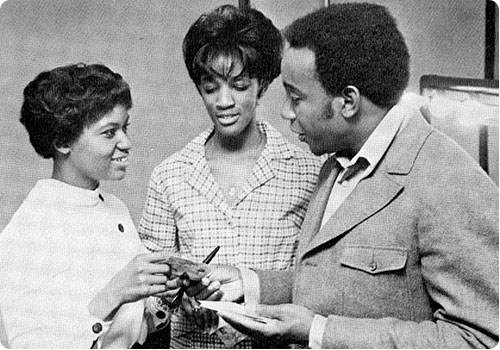
1970 African American Students
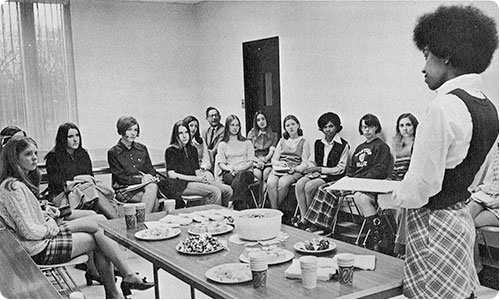
1971 Winthrop Fine Arts Association - WFAA president Beverly Love speaks to the group during a meeting.
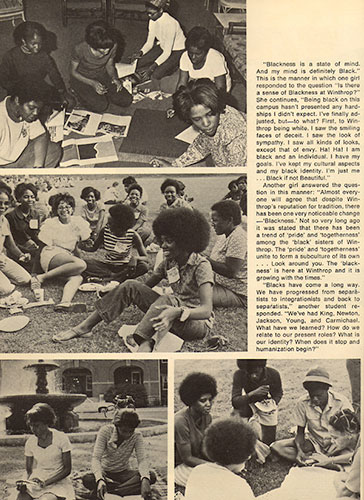
1972 Tatler - “Blackness is a state of mind. And my mind is definitely Black. This is the manner in which one girl responded to the question “Is there a sense of Blackness at Winthrop?” She continues, “Being black on this campus hasn’t presented any hardships I didn’t expect. I’ve finally adjusted, but – to what? First, to Winthrop being white. I saw the smiling faces of deceit. I saw the look of sympathy. I saw all kinds of looks, except that of envy. Ha! Ha! I am black and an individual. I have my goals. I’ve kept my cultural aspects and my black identity. I’m just me…Black if not Beautiful.” Another girl answered the question in this manner: “Almost everyone will agree that despite Winthrop’s reputation for tradition, there has been one very noticeable change – ‘Blackness.’ Not so very long ago it was stated that there has been a trend of ‘pride’ and ‘togetherness’ among the ‘black’ sisters of Winthrop. The ‘pride’ and ‘togetherness’ unite to form a subculture of its own…Look around you. The ‘blackness’ is here at Winthrop and it is growing with the times.” “Blacks have come a long way. We have progressed from separatists to integrationists and back to separatists,” another student responded. “We’ve had King, Newton, Jackson, Young, and Carmichael. What have we learned? How do we relate to our present roles? What is our identity? When does it stop and humanization begin?”
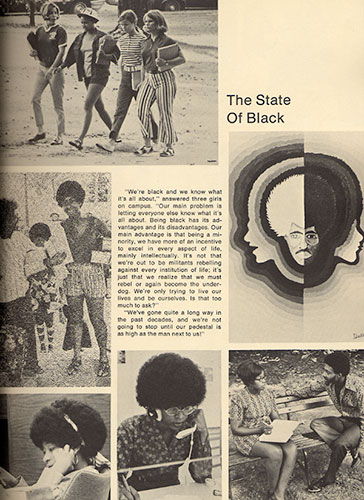
1972 Tatler - The State of Black “We’re black and we know what it’s all about,” answered three girls on campus. “Our main problem is letting everyone else know what it’s all about. Being black has its advantages and its disadvantages. Our main advantage is that being a minority, we have more of an incentive to excel in every aspect of life, mainly intellectually. It’s not that we’re out to be militants rebelling against every institution of life; it’s just that we realize that we must rebel or again become the underdog. We’re only trying to live our lives and be ourselves. Is that too much to ask?” “We’ve gone quite a long way in the past decades, and we’re not going to stop until our pedestal is as high as the man next to us!”
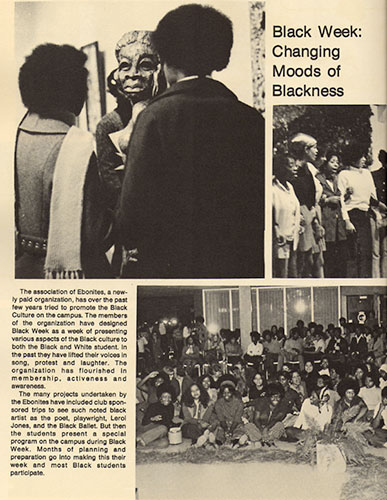
1972 Tatler - Black Week: Changing Moods of Blackness The association of Ebonites, a newly paid, organization, has over the past few years tried to promote the Black Culture on the campus. The members of the organization have designed Black Week as a week of presenting various aspects of the Black culture to both the Black and White student. In the past they have lifted their voices in song, protest and laughter. The organization has flourished in membership, activeness and awareness. The many projects undertaken by the Ebonites have included club sponsored trips to see such noted black artists as the poet, playwright, Lerol Jones, and the Black Ballet. But then the students present a special program on the campus during Black Week. Months of planning and preparation go into making this their week and most Black students participate.
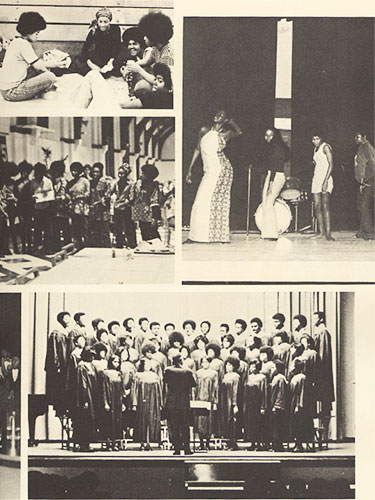
1972 Tatler - Fashion & Singing
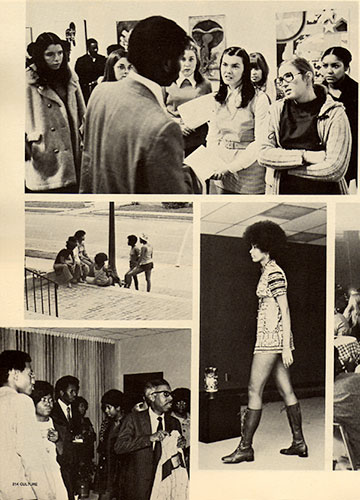
1972 Tatler - Fashion & Speaker
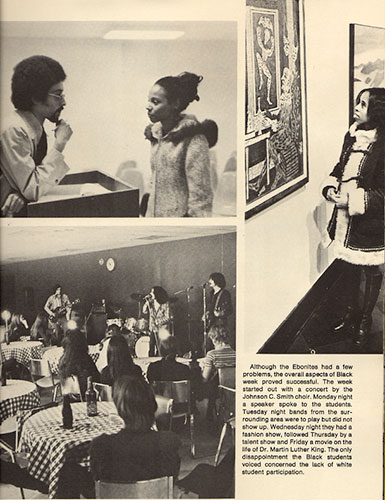
1972 Tatler - Art & Music Although the Ebonites had a few problems, the overall aspects of Black week proved successful. The week started out with a concert by the Johnson C. Smith choir. Monday night a speaker spoke to the students. Tuesday night bands from the surrounding area were to play but did not show up. Wednesday night they had a fashion show, followed Thursday by a talent show and Friday a movie on the life of Dr. Martin Luther King. The only disappointment the Black students voiced concerned the lack of white student participation.
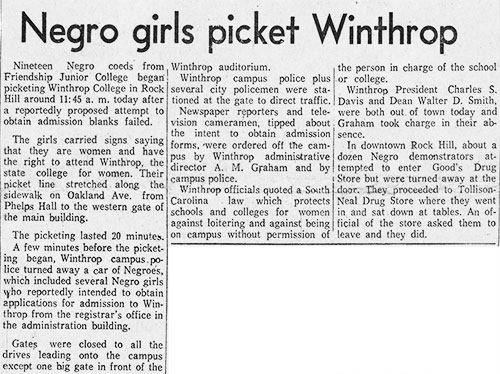
1961: Feb. 17 - The Herald - Negro Girls Picket Winthrop

1961: Feb. 18 - The State - Negro Coeds Seek Entry to Winthrop
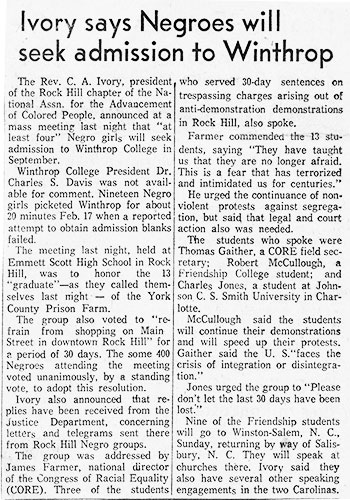
1961: March 11 - The Herald - Ivory Says Negroes Will Seek Admission to Winthrop
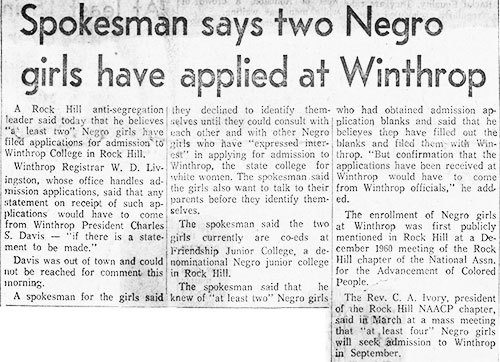
1961: May 15 - The Herald - Spokesman Says Two Negro Girls Have Applied at Winthrop

1961: May 17 - The State - Negroes Apply at Winthrop, Davis Confirms Earlier Report

1961: May 19 - The State - Negroes Seek Admission to 2 State Colleges
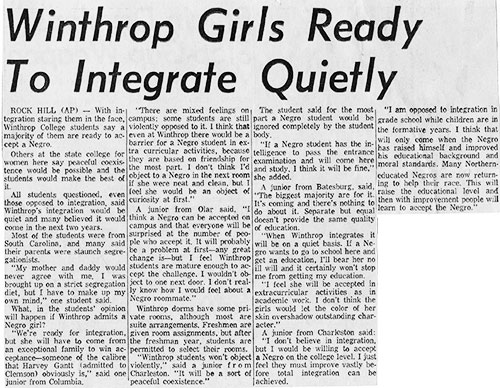
1963: Feb. 21 - News and Courier - Winthrop Girls Ready to Integrate Quietly
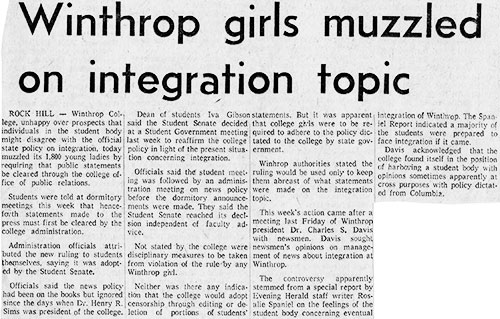
1963: March 16 - The Herald - Winthrop Girls Muzzled on Integration Topic
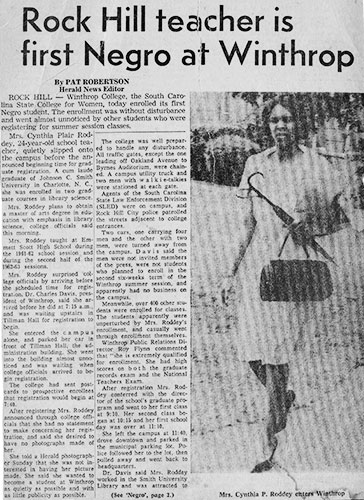
1964: July 20 - The Herald - Rock Hill Teacher is First Negro at Winthrop
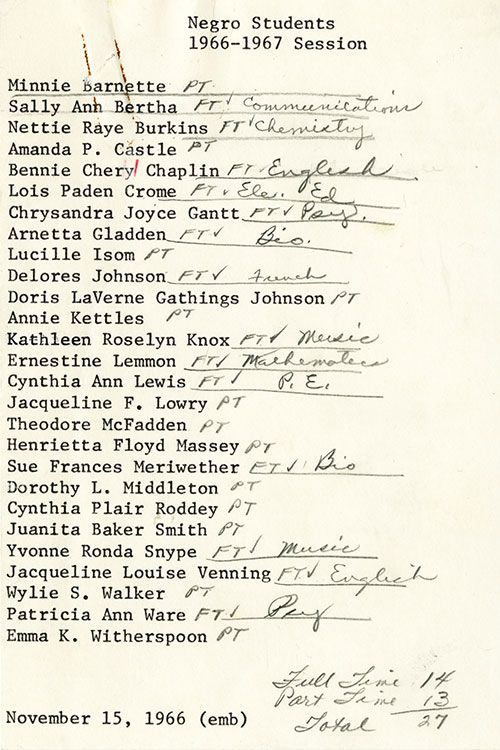
1966-1967: Negro Students Enrolled at Winthrop - Thirteen full-time students and the thirteen part-time students enrolled at Winthrop.
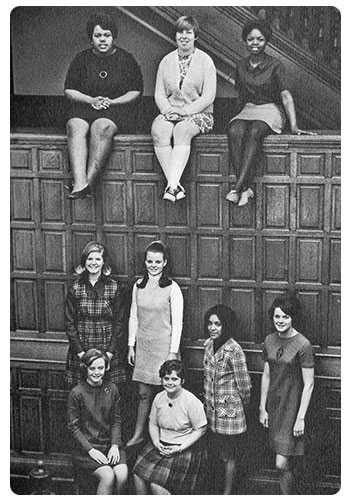
1969: Young Democrats - Two politically active groups on campus, the Winthrop College Young Democrats and the Winthrop College Young Republicans, endeavor to acquaint students with current issues. Working to politically activate their members in a useful and meaningful way, these groups campaign with the national organizations on local, state, and national levels. Left to Right First Row: Kathy Davis, Lynda Herns (President), Jessica Davis, Linda Cauthren, Sharon Bowman, Grace Gamble. Second Row: Henrietta McElrath, Kathy Kirk, Bernice White.
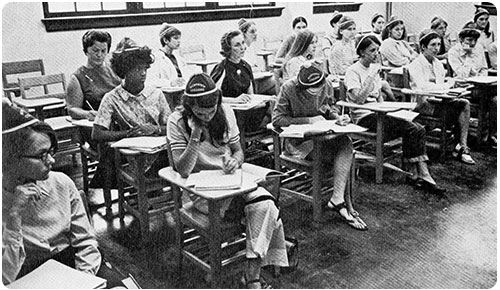
1970 Typical Classroom
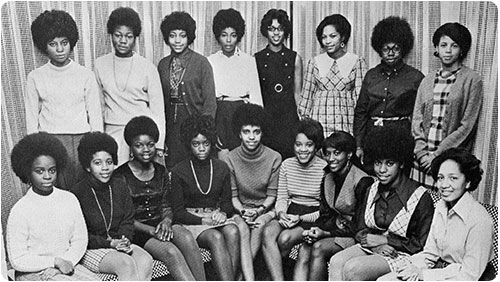
1970 Ebonites - The newly organized Ebonites endeavor to promote greater awareness of Black culture through regular meeting. A Fashion Show was sponsored by the club in November. Left to Right First Row: Sheila L. Frasier, Patricia Ware (President), Bernice White (Vice-President), Bennie Chaplin (Secretary), Beverly Love (Corresponding Secretary), Vicki Young (Treasurer), Meta Wright (Parliamentarian), Jacqueline Venning, Patricia Jackson. Second Row: Sally Bertha, Ernestine Lemmon, Claudette Hopkins, Mari Richardson, Gloria J. Chisholm, Geraldine Feemster, Cynthia Ann Lewis, Winifred Edwards.

1970 Graduate School Adds Two New Degrees - Two major changes were made in the Graduate School this year. A Master of Business Administration, qualifying recipients of this degree to teach in community colleges and at technical education centers, was added. A new program in Communications was implemented, primarily for speech therapists. In addition, Winthrop offers the Master of Arts, Master of Arts in Teaching, Master of Education, Master of Music, and Master of Science degrees. Mrs. Heath uses group discussion for better comprehension in Sociology course.

1970 African American Students

1970 African American Students

1971 Winthrop Fine Arts Association - WFAA president Beverly Love speaks to the group during a meeting.

1972 Tatler - “Blackness is a state of mind. And my mind is definitely Black. This is the manner in which one girl responded to the question “Is there a sense of Blackness at Winthrop?” She continues, “Being black on this campus hasn’t presented any hardships I didn’t expect. I’ve finally adjusted, but – to what? First, to Winthrop being white. I saw the smiling faces of deceit. I saw the look of sympathy. I saw all kinds of looks, except that of envy. Ha! Ha! I am black and an individual. I have my goals. I’ve kept my cultural aspects and my black identity. I’m just me…Black if not Beautiful.” Another girl answered the question in this manner: “Almost everyone will agree that despite Winthrop’s reputation for tradition, there has been one very noticeable change – ‘Blackness.’ Not so very long ago it was stated that there has been a trend of ‘pride’ and ‘togetherness’ among the ‘black’ sisters of Winthrop. The ‘pride’ and ‘togetherness’ unite to form a subculture of its own…Look around you. The ‘blackness’ is here at Winthrop and it is growing with the times.” “Blacks have come a long way. We have progressed from separatists to integrationists and back to separatists,” another student responded. “We’ve had King, Newton, Jackson, Young, and Carmichael. What have we learned? How do we relate to our present roles? What is our identity? When does it stop and humanization begin?”

1972 Tatler - The State of Black “We’re black and we know what it’s all about,” answered three girls on campus. “Our main problem is letting everyone else know what it’s all about. Being black has its advantages and its disadvantages. Our main advantage is that being a minority, we have more of an incentive to excel in every aspect of life, mainly intellectually. It’s not that we’re out to be militants rebelling against every institution of life; it’s just that we realize that we must rebel or again become the underdog. We’re only trying to live our lives and be ourselves. Is that too much to ask?” “We’ve gone quite a long way in the past decades, and we’re not going to stop until our pedestal is as high as the man next to us!”

1972 Tatler - Black Week: Changing Moods of Blackness The association of Ebonites, a newly paid, organization, has over the past few years tried to promote the Black Culture on the campus. The members of the organization have designed Black Week as a week of presenting various aspects of the Black culture to both the Black and White student. In the past they have lifted their voices in song, protest and laughter. The organization has flourished in membership, activeness and awareness. The many projects undertaken by the Ebonites have included club sponsored trips to see such noted black artists as the poet, playwright, Lerol Jones, and the Black Ballet. But then the students present a special program on the campus during Black Week. Months of planning and preparation go into making this their week and most Black students participate.

1972 Tatler - Fashion & Singing

1972 Tatler - Fashion & Speaker

1972 Tatler - Art & Music Although the Ebonites had a few problems, the overall aspects of Black week proved successful. The week started out with a concert by the Johnson C. Smith choir. Monday night a speaker spoke to the students. Tuesday night bands from the surrounding area were to play but did not show up. Wednesday night they had a fashion show, followed Thursday by a talent show and Friday a movie on the life of Dr. Martin Luther King. The only disappointment the Black students voiced concerned the lack of white student participation.

1961: Feb. 17 - The Herald - Negro Girls Picket Winthrop

1961: Feb. 18 - The State - Negro Coeds Seek Entry to Winthrop

1961: March 11 - The Herald - Ivory Says Negroes Will Seek Admission to Winthrop

1961: May 15 - The Herald - Spokesman Says Two Negro Girls Have Applied at Winthrop

1961: May 17 - The State - Negroes Apply at Winthrop, Davis Confirms Earlier Report

1961: May 19 - The State - Negroes Seek Admission to 2 State Colleges

1963: Feb. 21 - News and Courier - Winthrop Girls Ready to Integrate Quietly

1963: March 16 - The Herald - Winthrop Girls Muzzled on Integration Topic

1964: July 20 - The Herald - Rock Hill Teacher is First Negro at Winthrop

1966-1967: Negro Students Enrolled at Winthrop - Thirteen full-time students and the thirteen part-time students enrolled at Winthrop.

1969: Young Democrats - Two politically active groups on campus, the Winthrop College Young Democrats and the Winthrop College Young Republicans, endeavor to acquaint students with current issues. Working to politically activate their members in a useful and meaningful way, these groups campaign with the national organizations on local, state, and national levels. Left to Right First Row: Kathy Davis, Lynda Herns (President), Jessica Davis, Linda Cauthren, Sharon Bowman, Grace Gamble. Second Row: Henrietta McElrath, Kathy Kirk, Bernice White.

1970 Typical Classroom

1970 Ebonites - The newly organized Ebonites endeavor to promote greater awareness of Black culture through regular meeting. A Fashion Show was sponsored by the club in November. Left to Right First Row: Sheila L. Frasier, Patricia Ware (President), Bernice White (Vice-President), Bennie Chaplin (Secretary), Beverly Love (Corresponding Secretary), Vicki Young (Treasurer), Meta Wright (Parliamentarian), Jacqueline Venning, Patricia Jackson. Second Row: Sally Bertha, Ernestine Lemmon, Claudette Hopkins, Mari Richardson, Gloria J. Chisholm, Geraldine Feemster, Cynthia Ann Lewis, Winifred Edwards.

1970 Graduate School Adds Two New Degrees - Two major changes were made in the Graduate School this year. A Master of Business Administration, qualifying recipients of this degree to teach in community colleges and at technical education centers, was added. A new program in Communications was implemented, primarily for speech therapists. In addition, Winthrop offers the Master of Arts, Master of Arts in Teaching, Master of Education, Master of Music, and Master of Science degrees. Mrs. Heath uses group discussion for better comprehension in Sociology course.

1970 African American Students

1970 African American Students

1971 Winthrop Fine Arts Association - WFAA president Beverly Love speaks to the group during a meeting.

1972 Tatler - “Blackness is a state of mind. And my mind is definitely Black. This is the manner in which one girl responded to the question “Is there a sense of Blackness at Winthrop?” She continues, “Being black on this campus hasn’t presented any hardships I didn’t expect. I’ve finally adjusted, but – to what? First, to Winthrop being white. I saw the smiling faces of deceit. I saw the look of sympathy. I saw all kinds of looks, except that of envy. Ha! Ha! I am black and an individual. I have my goals. I’ve kept my cultural aspects and my black identity. I’m just me…Black if not Beautiful.” Another girl answered the question in this manner: “Almost everyone will agree that despite Winthrop’s reputation for tradition, there has been one very noticeable change – ‘Blackness.’ Not so very long ago it was stated that there has been a trend of ‘pride’ and ‘togetherness’ among the ‘black’ sisters of Winthrop. The ‘pride’ and ‘togetherness’ unite to form a subculture of its own…Look around you. The ‘blackness’ is here at Winthrop and it is growing with the times.” “Blacks have come a long way. We have progressed from separatists to integrationists and back to separatists,” another student responded. “We’ve had King, Newton, Jackson, Young, and Carmichael. What have we learned? How do we relate to our present roles? What is our identity? When does it stop and humanization begin?”

1972 Tatler - The State of Black “We’re black and we know what it’s all about,” answered three girls on campus. “Our main problem is letting everyone else know what it’s all about. Being black has its advantages and its disadvantages. Our main advantage is that being a minority, we have more of an incentive to excel in every aspect of life, mainly intellectually. It’s not that we’re out to be militants rebelling against every institution of life; it’s just that we realize that we must rebel or again become the underdog. We’re only trying to live our lives and be ourselves. Is that too much to ask?” “We’ve gone quite a long way in the past decades, and we’re not going to stop until our pedestal is as high as the man next to us!”

1972 Tatler - Black Week: Changing Moods of Blackness The association of Ebonites, a newly paid, organization, has over the past few years tried to promote the Black Culture on the campus. The members of the organization have designed Black Week as a week of presenting various aspects of the Black culture to both the Black and White student. In the past they have lifted their voices in song, protest and laughter. The organization has flourished in membership, activeness and awareness. The many projects undertaken by the Ebonites have included club sponsored trips to see such noted black artists as the poet, playwright, Lerol Jones, and the Black Ballet. But then the students present a special program on the campus during Black Week. Months of planning and preparation go into making this their week and most Black students participate.

1972 Tatler - Fashion & Singing

1972 Tatler - Fashion & Speaker

1972 Tatler - Art & Music Although the Ebonites had a few problems, the overall aspects of Black week proved successful. The week started out with a concert by the Johnson C. Smith choir. Monday night a speaker spoke to the students. Tuesday night bands from the surrounding area were to play but did not show up. Wednesday night they had a fashion show, followed Thursday by a talent show and Friday a movie on the life of Dr. Martin Luther King. The only disappointment the Black students voiced concerned the lack of white student participation.

1961: Feb. 17 - The Herald - Negro Girls Picket Winthrop

1961: Feb. 18 - The State - Negro Coeds Seek Entry to Winthrop

1961: March 11 - The Herald - Ivory Says Negroes Will Seek Admission to Winthrop

1961: May 15 - The Herald - Spokesman Says Two Negro Girls Have Applied at Winthrop

1961: May 17 - The State - Negroes Apply at Winthrop, Davis Confirms Earlier Report

1961: May 19 - The State - Negroes Seek Admission to 2 State Colleges

1963: Feb. 21 - News and Courier - Winthrop Girls Ready to Integrate Quietly

1963: March 16 - The Herald - Winthrop Girls Muzzled on Integration Topic

1964: July 20 - The Herald - Rock Hill Teacher is First Negro at Winthrop

1966-1967: Negro Students Enrolled at Winthrop - Thirteen full-time students and the thirteen part-time students enrolled at Winthrop.

1969: Young Democrats - Two politically active groups on campus, the Winthrop College Young Democrats and the Winthrop College Young Republicans, endeavor to acquaint students with current issues. Working to politically activate their members in a useful and meaningful way, these groups campaign with the national organizations on local, state, and national levels. Left to Right First Row: Kathy Davis, Lynda Herns (President), Jessica Davis, Linda Cauthren, Sharon Bowman, Grace Gamble. Second Row: Henrietta McElrath, Kathy Kirk, Bernice White.

1970 Typical Classroom

1970 Ebonites - The newly organized Ebonites endeavor to promote greater awareness of Black culture through regular meeting. A Fashion Show was sponsored by the club in November. Left to Right First Row: Sheila L. Frasier, Patricia Ware (President), Bernice White (Vice-President), Bennie Chaplin (Secretary), Beverly Love (Corresponding Secretary), Vicki Young (Treasurer), Meta Wright (Parliamentarian), Jacqueline Venning, Patricia Jackson. Second Row: Sally Bertha, Ernestine Lemmon, Claudette Hopkins, Mari Richardson, Gloria J. Chisholm, Geraldine Feemster, Cynthia Ann Lewis, Winifred Edwards.

1970 Graduate School Adds Two New Degrees - Two major changes were made in the Graduate School this year. A Master of Business Administration, qualifying recipients of this degree to teach in community colleges and at technical education centers, was added. A new program in Communications was implemented, primarily for speech therapists. In addition, Winthrop offers the Master of Arts, Master of Arts in Teaching, Master of Education, Master of Music, and Master of Science degrees. Mrs. Heath uses group discussion for better comprehension in Sociology course.

1970 African American Students

1970 African American Students

1971 Winthrop Fine Arts Association - WFAA president Beverly Love speaks to the group during a meeting.

1972 Tatler - “Blackness is a state of mind. And my mind is definitely Black. This is the manner in which one girl responded to the question “Is there a sense of Blackness at Winthrop?” She continues, “Being black on this campus hasn’t presented any hardships I didn’t expect. I’ve finally adjusted, but – to what? First, to Winthrop being white. I saw the smiling faces of deceit. I saw the look of sympathy. I saw all kinds of looks, except that of envy. Ha! Ha! I am black and an individual. I have my goals. I’ve kept my cultural aspects and my black identity. I’m just me…Black if not Beautiful.” Another girl answered the question in this manner: “Almost everyone will agree that despite Winthrop’s reputation for tradition, there has been one very noticeable change – ‘Blackness.’ Not so very long ago it was stated that there has been a trend of ‘pride’ and ‘togetherness’ among the ‘black’ sisters of Winthrop. The ‘pride’ and ‘togetherness’ unite to form a subculture of its own…Look around you. The ‘blackness’ is here at Winthrop and it is growing with the times.” “Blacks have come a long way. We have progressed from separatists to integrationists and back to separatists,” another student responded. “We’ve had King, Newton, Jackson, Young, and Carmichael. What have we learned? How do we relate to our present roles? What is our identity? When does it stop and humanization begin?”

1972 Tatler - The State of Black “We’re black and we know what it’s all about,” answered three girls on campus. “Our main problem is letting everyone else know what it’s all about. Being black has its advantages and its disadvantages. Our main advantage is that being a minority, we have more of an incentive to excel in every aspect of life, mainly intellectually. It’s not that we’re out to be militants rebelling against every institution of life; it’s just that we realize that we must rebel or again become the underdog. We’re only trying to live our lives and be ourselves. Is that too much to ask?” “We’ve gone quite a long way in the past decades, and we’re not going to stop until our pedestal is as high as the man next to us!”

1972 Tatler - Black Week: Changing Moods of Blackness The association of Ebonites, a newly paid, organization, has over the past few years tried to promote the Black Culture on the campus. The members of the organization have designed Black Week as a week of presenting various aspects of the Black culture to both the Black and White student. In the past they have lifted their voices in song, protest and laughter. The organization has flourished in membership, activeness and awareness. The many projects undertaken by the Ebonites have included club sponsored trips to see such noted black artists as the poet, playwright, Lerol Jones, and the Black Ballet. But then the students present a special program on the campus during Black Week. Months of planning and preparation go into making this their week and most Black students participate.

1972 Tatler - Fashion & Singing

1972 Tatler - Fashion & Speaker

1972 Tatler - Art & Music Although the Ebonites had a few problems, the overall aspects of Black week proved successful. The week started out with a concert by the Johnson C. Smith choir. Monday night a speaker spoke to the students. Tuesday night bands from the surrounding area were to play but did not show up. Wednesday night they had a fashion show, followed Thursday by a talent show and Friday a movie on the life of Dr. Martin Luther King. The only disappointment the Black students voiced concerned the lack of white student participation.